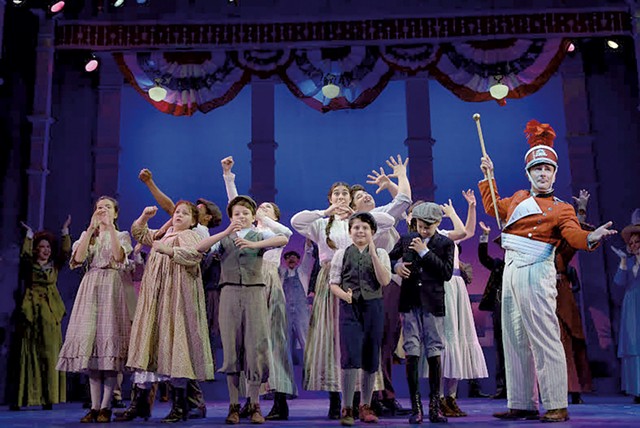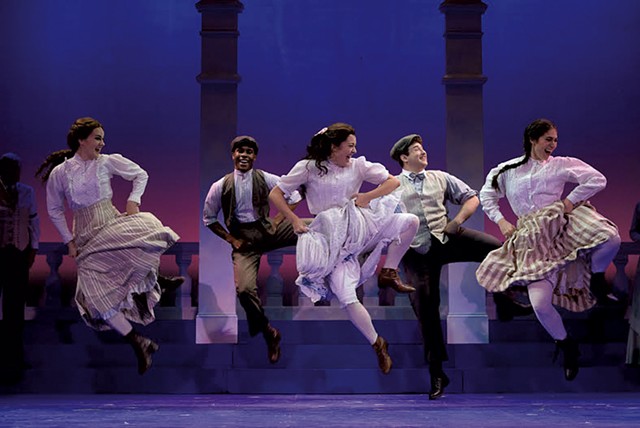
- Courtesy of Hubert Schreibl
- 'The Music Man'
Winner of the Tony Award for best musical when it opened on Broadway in 1957, The Music Man is a crowd pleaser that plumbs a range of musical idioms, from syncopation to patter to marching bands to barbershop quartets. Meredith Willson wrote music, lyrics and book, and developed the story with Franklin Lacey. It was Willson's first musical, and his playfulness shows in the concept and execution.
Weston Playhouse brings out all the joy in this nostalgic yet satirical look at 1912 America. Director Malcolm Ewen leads a crack creative team and an energetic troupe of actors. The result is midsummer magic in song, dance and the visual bounty of great costumes and a dazzling set.
Harold Hill is an unabashed swindler who's come to fleece the folks of River City, Iowa. His scam is selling musical instruments and uniforms, promising to teach the kids to form a band. Harold hasn't an ounce of musical training, and his plan is to skip town once he's collected the money.
Marian, the straitlaced librarian and piano teacher, is secretly onto him. The two fall in love in fits and starts, and if the outcome is obvious, the sight of a con artist telling the truth to his beloved and to himself is a neat little triumph.
Harold is a charlatan but ends up doing a world of good. He brings harmony: The four-man school board does nothing but bicker until Hill sounds four notes on his pitch pipe to launch them off in close harmony as a barbershop quartet. Now they can't stop singing, and how can they argue once they're tuned to the bass?
He brings confidence: Marian's little brother, Winthrop, is shy and lisps; Harold inspires him to sing. The whole town grows prouder and happier as they imagine the band-to-be, and Harold's smooth-talking aplomb rubs off on everyone.
Willson's playful approach to the music is epitomized in the pair of songs given as signatures to the lead characters. Harold's "Seventy-Six Trombones" is sung at a crisp march tempo, while Marian's "Goodnight, My Someone" is a dreamy waltz. The same melody is hidden in each; rhythm makes all the difference. As the characters realize they're in love, they reprise these songs in counterpoint, and the audience can hear what the beat once masked. Willson's final touch is to give Marian a few bars of Harold's tune, and vice versa. It's love as consonance.
The show begins with "Rock Island," a bravura piece of syncopation as eight traveling salesmen produce the rhythm of a train as they speak/sing about their work and how shysters like Harold Hill can ruin their territory. Weston's virtuoso performers are seated but convey all the speed and sway of rail travel in a neatly choreographed scene.
Willson builds songs out of a rote piano exercise ("Piano Lesson") and a nonsense word that's so fun to sing, it starts to make sense ("Shipoopi"). He sets a big number in a library, the place where everyone is shushed. And the show gives young children and teenagers major acting and singing roles; Weston's young players Margo Potter, Sander Scott and Matthew Pitts are standouts.
In his 30th year at Weston, David Bonanno is nonstop lovable as Harold Hill. With a straw boater tilted lazily on the back of his head, Bonanno overflows with the composure Harold needs to stay one jaunty step ahead of his marks. He's truly tender with Marian, and those dark eyes peering out from eyebrows arched in innocence can fool, or woo, anyone. In the signature patter song "Trouble," Bonanno simply wows; the con is sprung and the audience is as captivated as the townspeople.

- Courtesy of Hubert Schreibl
- 'The Music Man'
Marissa McGowan brings as much strength as sweetness to Marian. As written, the character is passive, but McGowan fills her with some fire and turns a mawkish love story into a courageous one. McGowan's fine singing is expressive throughout, crowned with a lovely "Till There Was You."
As Marian's wise mother, Cathy Newman radiates Irish wit and warmth. Dorothy Stanley leads a brigade of gossipy ladies, while Munson Hicks bloviates as her husband, the mayor.
Musical director and keyboardist Larry Pressgrove makes a small 5-man pit band sound fully triple the size. After reducing orchestrations by featuring specific instruments, he gets double duty from every band member. Hidden in the pit, the reed player juggles five different instruments, while the trumpet player fills in as needed. The rapid instrument swaps leave the audience hearing the big presence of a brass band with a fine sense of swing.
Michael Raine's choreography fills Weston's stage with life and energy. Using surging lines that cross and re-cross on diagonals, he creates a bustling city for "Iowa Stubborn." In "Marian the Librarian," he gives the teenagers books to clap and toss as percussion, then inserts a book trolley to catalyze the action between flirtatious Harold and obstinate Marian.
The scenic design by Howard C. Jones uses pinpoint details to evoke nine separate locations. The period touches include lavish bunting and replicas of advertising typography on town signs. Stuart Duke's lighting design suggests mood and time of day with a wash on the scrim, while the color and direction of overall lighting gives fine spatial structure.
Costume designer Kirche Leigh Zeile uses vivid color and rich detail to thrill an audience. From the smashing, flap-turned band coats to a flotilla of ladies' dresses sailing down Main Street, Zeile paints a lively picture of 1912 fashion.
A con man's job is figuring out what people yearn for and tricking them into giving him something on their way to fulfilling their dreams on their own. Watching Harold Hill transform River City for both his gain and theirs is pure delight.









Comments
Comments are closed.
From 2014-2020, Seven Days allowed readers to comment on all stories posted on our website. While we've appreciated the suggestions and insights, right now Seven Days is prioritizing our core mission — producing high-quality, responsible local journalism — over moderating online debates between readers.
To criticize, correct or praise our reporting, please send us a letter to the editor or send us a tip. We’ll check it out and report the results.
Online comments may return when we have better tech tools for managing them. Thanks for reading.